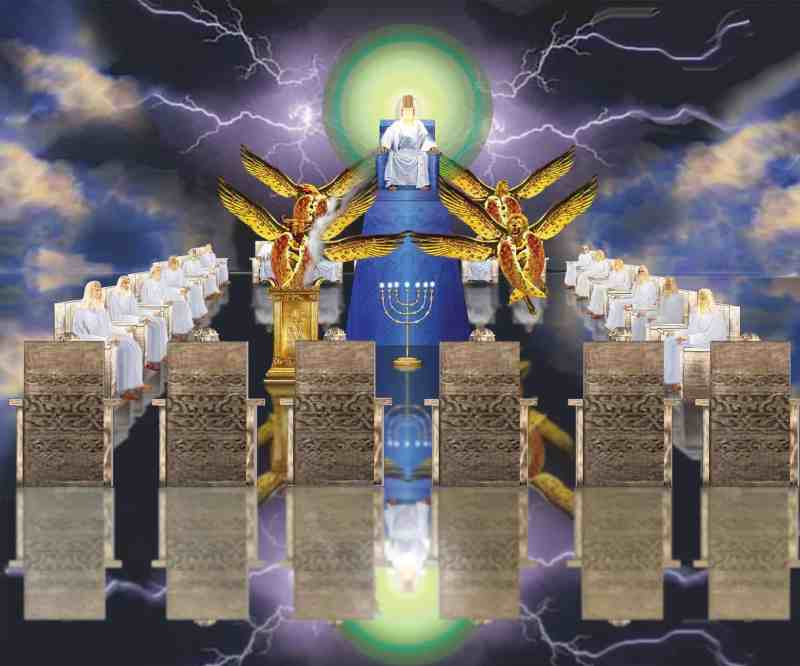What Does Thunder Symbolize In The Bible – Most people in the world do not experience lasting joy in their lives. We are on a mission to change that. All of our resources exist to guide you to eternal joy in Jesus Christ.
In sub-Saharan West Africa, the dry season slowly tightens its death grip until that first storm. It starts as a speck on the horizon. The breeze stops; the heat like a furnace threatens to consume everything in its oven. Dark clouds piled on top of each other in the distance, as if in a mad race to block out the sun.
What Does Thunder Symbolize In The Bible

Then comes the wind: at first a whisper, but soon a powerful force that raises months of dust and sand, turning them into miniature tornadoes. In our early years, my siblings and I would run away and try to fight the force of these winds. Taking our place on the old garden mounds of last season’s plantation, we will test our young legs against the power of the storm (always an exercise in futility).
The Meaning Of The Number Three In The Bible
Then the sky turns black. The rolling clouds conquered the sun, declaring victory with flashes of lightning and mighty cracks of thunder, a barrage of heavenly artillery. Finally, finally, the rain comes – a marching wall of gray that obscures everything that passes, driven by the relentless wind. We fled for the house as it approached and then flooded our street, turning the hard ground into a sudden river.
I have always been amazed by the power of storms. Its sheer power exhilarates and overwhelms me. They produce in me a certain diminishing effect, reminding me that although God has given humans dominion over the earth, I am still made of dust. It is suitable for escape.
But God designed the storms to teach us more about our smallness. In their unleashed fury, they are the emblems of God’s wrath poured out in judgment. The short book of Nahum, inserted among the minor prophets, is one such place where God teaches us to read well events in nature such as storms.
The short oracle of Nahum, only 47 verses in our English translations, thunders with God’s righteous judgment against Nineveh, one of the great cities of the ancient Assyrian empire. We usually associate Nineveh with the ministry of Jonah. Jonah knew that God was “a gracious and merciful God, slow to anger and abounding in steadfast love, and relinquished from disaster” (Jonah 4:2). Thus, he preached to the enemies of Israel with reluctance, knowing that his prophetic word of judgment could be right to the preservation of Nineveh.
The Two Olive Trees & Two Witnesses
We know the story. Nineveh repented, and God, in accordance with his character, withdrew from unleashing disaster on them (Jonah 3: 6-10). These events took place during the reign of Jeroboam II of Israel (2 Kings 14:25), which lasted from about 793 to 753 BC (Dictionary of the Old Testament: Prophets, 456).
It may come as a surprise, then, that Nahum’s prophecy a century or so later contained only words of judgment against Nineveh, with no opportunity for repentance. Prophesying to Judah around 650 BC after the fall of the northern kingdom in 722 in Assyria (
, 560), Nahum declared that Assyria would be washed away “with an overflowing deluge.” God would “make a complete end of the adversaries” of his people (Nahum 1:8).

Nineveh, once repented, had despised God’s mercy and directed its armies against God’s chosen people, taking the northern kingdom of Israel into captivity and even besieging Jerusalem itself during the reign of Hezekiah (2 Kings 18:17-25).
The True Meaning Of Luke 10:18
God directed his fury against this “bloody city, all full of lies and plunder” (Nahum 3:1), declaring that the name of Assyria and Nineveh would no longer be perpetuated among the nations of the earth (Nahum 1 : 14). And through Nahum’s poetic language, he captured his fury with the image of a storm.
) on his enemies. Similar to how the triple “holy, holy, holy” in Isaiah 6:3 emphasizes the completeness of God’s holiness, the repetition of Nahum.
Reveals the fullness of God’s wrath. Fierce clouds burn in the distance, and no one can stand their way. Although he is “slow to anger” – a slowness that Nineveh had experienced in the past – “the Lord did not meet the guilty”.
His way is turbulent and stormy, and the clouds are the dust of his feet. (Nahum 1:3)
Lightning In Dreams: Meaning & Symbolism
In the opening salvo of Nahum (1:1-8), like the rain clouds of West Africa that are piled on top of each other, they use image for image to describe the wrath of God Faced with his fury, the bodies of water dry up, the vegetation dries up, the mountains tremble, the earth rises, and the rocks split. His anger is “like fire” (1:6), like “a flood above” (1:8).
Anyone who has been caught in the elements by a mighty storm can appreciate, in part, the terror and doom that Nahum intends to convey. Through such storms, God means for us to understand in a small way what it feels like to face his hopeless judgment. The hymnist understood this sense well when he wrote,
His chariots of wrath form the deep clouds, and dark is his way on the wings of the storm.

Strong storms that flash and rage, that whip the dust into a frenzy and throw the rain in torrents, that wrap the earth in darkness, declaring the glory of his righteous judgment on the wicked, teaching him not to handle his anger lightly . They symbolize the fearful words uttered by God against unrepentant sinners: “Behold, I am against you” (Nahum 2:13; 3:5).
Lighting Struck The Christ The Redeemer Statue. What Is God Trying To Tell?
In 612 BC, about forty years after Nahum spoke his oracle against Nineveh, the city was invaded and destroyed by the Babylonians. Although a few Assyrians escaped and tried to re-establish it, they were also wiped out in 609 BC. The Assyrians disappeared (ESV Study Bible, 1710). In fact, only three hundred years later, an entire army passed over the place where Nineveh had been without even recognizing the location of the once famous city (The Books of Nahum, Habakkuk and Zephaniah, 72).
The Lord has given command over you: “Your name will no longer be perpetuated. . . . I will make your grave, because you are vile. (Nahum 1:14)
Nahum’s prophecy was not a hyperbolic description of God’s vengeance. Every word came. Nineveh took its stand against the tremendous storm of God’s wrath – and perished.
The fate of Nineveh reveals the holiness of God. He will not, cannot, allow sin to remain in His presence. Every unrepentant sinner stands, as it were, on the garden mountain of the ruins of ancient Nineveh, shaking a fist in the face of God and challenging him to throw the winds of wrath. God does not change. The same words that he uttered against Nineveh, he will repeat in judgment. “Here I am against you.” “Depart from me, you cursed, into the eternal fire prepared for the devil and his angels” (Matthew 25:41). No sinner will remain in the assembly of the righteous people of God (Psalm 1:5).
Jesus On The Cursed Tree
Although it may seem like a misnomer for one who is charged with prophesying judgment, Nahum’s name means “comfort.” But where to find comfort in his oracle?
Although Nahum spoke a word against Nineveh, his audience was the people of God, those who remained in the southern kingdom of Judah. Twice in the opening chapter, the Lord speaks directly to his people (1:12–13, 15), giving them reason for hope as he lifts the yoke of oppression that Assyria had placed upon them. This wicked nation will no longer pass through Judah to bring terror. As his word of wrath shows his holy character, so also this word of comfort. The punishment of God’s enemies shows, at the same time, his love to keep the covenant for his people.
Tucked away in Nahum’s initial description of God’s wrath is a little verse, a place of refuge from the storm:
The Lord is good, a stronghold in the day of trouble; he knows those who take refuge in him. (Nahum 1:7)
Thy Strong Word
This knowledge refers to more of God’s knowledge about his people. It suggests an intimate knowledge that means safety, an environment of love on its own. This is the same knowledge described by the Good Shepherd, who knows his sheep and preserves them until the end (John 10:14, 28-29). This knowledge serves as a firm foundation for hope (2 Timothy 2:19).
Those who are known by God have a refuge to which they can flee: not the pitiful garden mound, but the safe house, with windows that stand tight, solid walls and a strong roof. Although the storm rages outside, peace reigns in this stronghold.
God always provided a shelter from the storm. To Noah and his family he gave an ark, a fortress to carry them through the cleansing stream of wrath. He gave Moses a basket of reeds and pitch, a floating cradle to protect the future leader from the storm of Pharaoh’s decree. To Juna he gave the belly of a fish, a place of penance and preservation. To the disciples, he gave the God-man, whose words made a shelter for a boat hit by the waves. He gives us the risen and exalted Christ, and promises that all who take refuge in the shadow of his
What does wine symbolize in the bible, what does thunder symbolize, what does fire symbolize in the bible, what does 7 symbolize in the bible, what does 40 symbolize in the bible, what does silver symbolize in the bible, what does blood symbolize in the bible, what does water symbolize in the bible, what does salt symbolize in the bible, what does oil symbolize in the bible, what does jerusalem symbolize in the bible, what does wood symbolize in the bible






